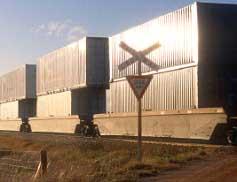This article belongs to Australia - Land of the Free? column.
The decision to withhold funding to the railways and promote road transport over Government run rail transport meant Australians paid dearly. Trains cause less pollution, are far safer, and should be carrying more freight and passengers. The Road Transport lobbyists were far more effective with Governments than their own employees. The result was many of the costs of road transport were absorbed by the public purse allowing trucking companies a great advantage over rail.
A fully loaded B-double truck causes as much damage to our roads as 20,000 cars. Heavy truck registration fees don't go anywhere near paying for the road damage caused. Yet, rail track access fees are far in excess of truck registration fees. This would suggest that truck registration fees should be increased to cover the cost of heavy trucks and lower car registration fees. This action would cause immense problems for heavy truck operators and many of them would be put out of business Rail transport is seven times safer than road transport, 0.55 fatalities per billion tonne kilometres to 3.8 for road transport. The National Road Transport Commission suggests that fatigue was a factor in 70% of truck accidents. Of the total cost of transport accidents in Road transport consumes almost 90% of Australia's transport energy with rail transport just 3% and only 2% of the nation's transport domestic greenhouse gas emissions with road transport a massive 86%. Transport now comprises 17% of Australia's greenhouse gas emissions – an increase of 15% over its 1990 level. One freight train operating over the nearly 1,000 kilometres between Melbourne and Sydney can replace 150 semi-trailers and save 45,000 litres of fuel and 130 tonnes of greenhouse gases compared with road haulage. Consider the implications. There are about 3,200 trucks per day between Melbourne and Sydney. That's one truck past any given point every 25 seconds. Yet, just ten additional trains each day each way between these two cities would remove all those trucks off the highway saving 330 million litres of fuel and 1 million tonnes of greenhouse gases per year. Instead of addressing these problems, it is forecast that fuel consumption by articulated vehicles will increase by 70% over the next fifteen years with greenhouse gas emissions 75% over the same period. That makes a mockery of Australia's commitment to lowering greenhouse gas emissions to be no more that 8% above its 1990 levels by 2012. Between 1975 and 1988, the Federal Government invested $34.5 billion on roads and $1.8 billion on rail. As a result, Australia's rail industry has to deliver 21st century service on 19th century infrastructure.

Goods Train with Double Containers
Why do some consumers prefer road transport for general freight? It is cheaper and faster. The cost advantage is caused partly by extra taxes and costs heaped on rail transport and partly by cost conscious road transport operators who are able to force contract drivers to work prohibitive hours. The speed of delivery is hampered in rail transport by slow loading techniques and slow trains. With improved track conditions, modern fast trains could compete with road transport.
How do governments in the 21st century correct the mistakes of earlier governments? They can't raise costs to road transport operators after decades of minimising their costs. We can imagine thousands of semi-trailers descending on
The profile of rail transport must be raised in this country and upgraded to be a significant partner with road, sea, and air transport.
The move to privatise the railways must be accelerated. The contest between the railways and road transport is a classic example of the difference between public and private enterprise with very predictable results. In short, the railways need entrepreneurs to revive and revitalise the industry. Where are the Sir Peter Abeles or the Sir Reginald Ansetts of the railways? They surely are needed.
Brian Nye Chief Executive Officer of Australasian Railways Association, Inc. puts it this way when commenting on a report commissioned from Port Jackson Partners and Access Economics:
'The obvious question the report raises is, if rail is economically so sound, why is the modal share so low on some corridors? This raises a number of issues about the distorting effects of current government policy on competition, economic regulation, assess pricing, and industry structure.'
Perhaps the penny has dropped with the opening of the new
If only those Governments in the past had to for sight to see how their bad decisions would take decades or maybe centuries to fix.
Sources: Austroads Website -
|
|


